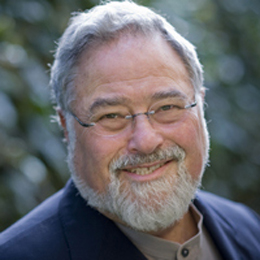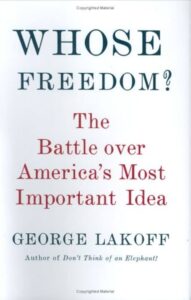Taking a Theme Back From the GOP
You wouldn’t consider George Lakoff a likely candidate to save democracy. But what the Harris-Walz campaign owes him is immeasurable.
The repetitive use of the image and message of “freedom” in the Harris-Walz campaign, including in Harris’s video announcing her candidacy, comes directly from Whose Freedom? The Battle Over America’s Most Important Idea.
Lakoff’s book, published in 2007 and republished this year, turns the GOP’s repetitious “patriotic” justification of reactionary policies on its head.
A key Lakoffian concept adopted by the Harris-Walz team emphasizes the distinction between the “strict, stern father/misogynist” hierarchy of the Republicans vs. the “nurturant parent model” of the Democrats.
Walz embraced Lakoff’s thinking when he told Republicans in an early August speech to “mind your own damn business” regarding women’s decisions about their bodies and, by implication, broader issues as well. That line now forms part of his stump speech.
“Freedom” appears prominently in Democratic Party campaign speeches, backdrops, videos,and posters handed out to DNC convention delegates. The anthem of the Harris-Walz campaign is Beyoncé’s rousing song Freedom. (Beyoncé has told the Trump campaign to cease its unauthorized use of her song, which has been unsuccessful so far.)
We cannot overestimate the importance of this rhetorical shift about freedom. After decades of Republicans wrapping themselves in the flag and claiming the mantle of freedom lovers, the Democrats are taking it back by redefining freedom along the lines that Lakoff teaches.

George Lakoff was the Richard and Rhoda Goldman Distinguished Professor of Cognitive Science and Linguistics at the University of California at Berkeley, retiring in 2016 as an internationally recognized scholar.
Lakoff is an academic with a passion for ensuring democracy thrives as it rejects the patriarchal-authoritarian model championed by Trump and the Republicans. For the Democrats to recapture the resonant patriotic imagery—recapture the flag, so to speak—is a monumental change in American politics.
During the golden age of BuzzFlash.com (before a catastrophic server error deleted our archives), we interviewed Lakoff several times and visited him in his Berkeley home.
Trump Minions
Lakoff was indefatigable in urging top Democrats to adopt his metaphoric model of flag-waving rhetoric, something that Harris-Walz have full-throatedly accomplished. As a result, they are well-positioned to win over voters to whom the words liberty and freedom, among others, resonate. They have seized the “country-loving” metaphoric labels from Trump and his minions.

It’s not the first time Lakoff has tried to get Democratic presidential campaigns to listen to him. It appeared that the first Obama campaign somewhat understood the importance of the Lakoff strategy. However, that seemed to stop when the “Hope and Change” of the Obama presidency reverted to hope without any dramatic change from the status quo once he was in office.
Hillary Clinton had consultants that she trusted and ran her campaign the way that she wanted. Biden and his communications team have been utterly clueless about messaging and framing, failing to convey what he has accomplished in building by far the strongest economy in the world.
Meanwhile, Lakoff had been writing a series of how-to books for Democratic campaigns. These include the essential Don’t Think of an Elephant: Know Your Values and Frame the Debate and Your Brain’s Politics.
Mom or Dad Model?
Another key Lakoffian concept adopted by the Harris-Walz team emphasizes the distinction between the “strict, stern father/misogynist” hierarchy of the Republicans vs. the “nurturant parent model” of the Democrats.

No one could exemplify the latter more as a candidate than Tim Walz, both in his biography and speeches. Lakoff warned me that it would not work to just give a rhetorical nod to the “nurturant parent model.” The Democrats need to offer and build models that exemplify caring and lifting up families and communities across America, a realizable alternative to ushering in untrammeled neoliberalism, one of those obfuscating words about reviving 19thCentury ideas about unfettered capitalism with no protections for those
I salvaged some of the original BuzzFlash material through the Wayback Machine. One of the many interviews I recovered was with Lakoff in 2004. It was titled “We’ll Grant This to the Republicans: They Know How to Frame Issues and Keep the Democrats on the Defensive. A BuzzFlash 2004 Interview with George Lakoff.”
In that interview, he explained how merging two words could completely change the popular understanding of an issue, often distorting it:
We all think metaphorically. When you add “tax” to “relief” to give you the term “tax relief,” it says that taxation is an affliction. That’s a new metaphor. Then, using the metaphor, anyone who gets rid of the taxation — the affliction — is a hero, and anybody who tries to stop him is a bad guy.
On the first day that Bush came into office, the language completely changed coming out of the White House. The press releases all changed. One of the new expressions that came in was the term “tax relief.” It evokes all of these things — that taxation is an affliction that we have to get rid of, that it’s a heroic thing to do, that people who try to prevent this heroic thing are bad guys.
The press releases went out to all the TV stations, all the radio stations, all the newspapers — and soon the media started using the term “tax relief.” That puts a certain frame out there: a conservative frame, not a progressive frame. Soon a lot of people are using the term “tax relief,” and before you know it, Democrats start using the term “tax relief,” and shooting themselves in the foot.
That’s a nice example of how language can evoke a way of understanding society, the world, economic policy, and so on, with just two words — very, very simple. This happens all the time.
Lakoff also noted that it is not the Enlightenment-era ideals of rational debate that drive voters, much as the Framers of our Constitution wished that is how our nation would develop.
Lakoff said that the way pollsters frame questions may miss voter motivations. He explained that pollsters typically assume that people vote “on the issues and on self-interest. Well, sometimes they do. But mostly they vote on their identity — on persons that they trust to be like them, or to be like people they admire.”
When we were about to leave Lakoff’s house following the interview, I asked him why the Republicans were so good at framing issues. He responded with alacrity (and I’ll take a stab at paraphrasing comments from more than 15 years ago): “The Republicans who run campaigns, in general, are from the business world. They understand marketing, even if it’s to get consumers to buy products that they don’t need.”
Lakoff is 83 now. He has witnessed two Democratic White House candidates running for president and vice president whose messaging is based on his recommendations. He might yet play an extraordinary role in saving democracy and saving the “nurturant parent model” from Trump’s tyrannical ash heap.




